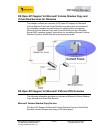
Exchange 2003 VSS Backup Solution
For IBM Storage DS8000/DS6000
And Symantec Backup Exec 11d
Page 32 David West, David Hartman
©
Copyright IBM Corp. 2007
You must install the CIM agent, a middleware application that provides a
CIM-compliant interface, before installing Microsoft Volume Shadow Copy
and Virtual Disk Services. The Microsoft Volume Shadow Copy and Virtual
Disk Services use the CIM technology to manage proprietary devices as
open system devices through storage management applications.
DS Open API support for Microsoft Volume Shadow Copy Service enables
users to quickly backup and restore large amounts of data on Windows
Server 2003. Microsoft Volume Shadow Copy Service coordinates with a
provider and the storage unit to create a consistent shadow copy of a volume
or group of volumes at a point-in-time. Point-in-time shadow copies ensure
consistency for Microsoft Volume Shadow Copy Service-aware writers, and
also work with applications that do not support Microsoft Volume Shadow
Copy Service technology. The shadow copy can be created while the volume
is mounted and files are in use.
In order to accomplish this fast backup, a backup application initiates a
shadow copy backup. Microsoft Volume Shadow Copy Service then
coordinates with the Microsoft Volume Shadow Copy Service writers to briefly
quiesce writes to the databases, applications, or both. Next, Microsoft
Volume Shadow Copy Service flushes the file system buffers and asks a
provider to initiate a FlashCopy of the data. Once the FlashCopy is logically
complete, Microsoft Volume Shadow Copy Service allows application writes
to resume.
The volumes are then mounted hidden and read-only, to be used when rapid
restore is necessary. Alternatively, the volumes can be mounted on a
different host and used for application testing or backup to tape.
Microsoft Virtual Disk Service
DS Open API Support for Microsoft Virtual Disk Service provides a single
vendor and technology neutral interface designed to manage block storage
virtualization, whether done by OS software, RAID storage hardware, or other
storage virtualization engines. Microsoft Virtual Disk Service is designed to
enable the management of heterogeneous storage systems, by using both
client and provider APIs. The service is designed to allow you to perform the
following functions:
• List Information about:
o Providers
o Subsystems
o Controllers
o LUNs
o Drives
• Create or delete LUNs


















